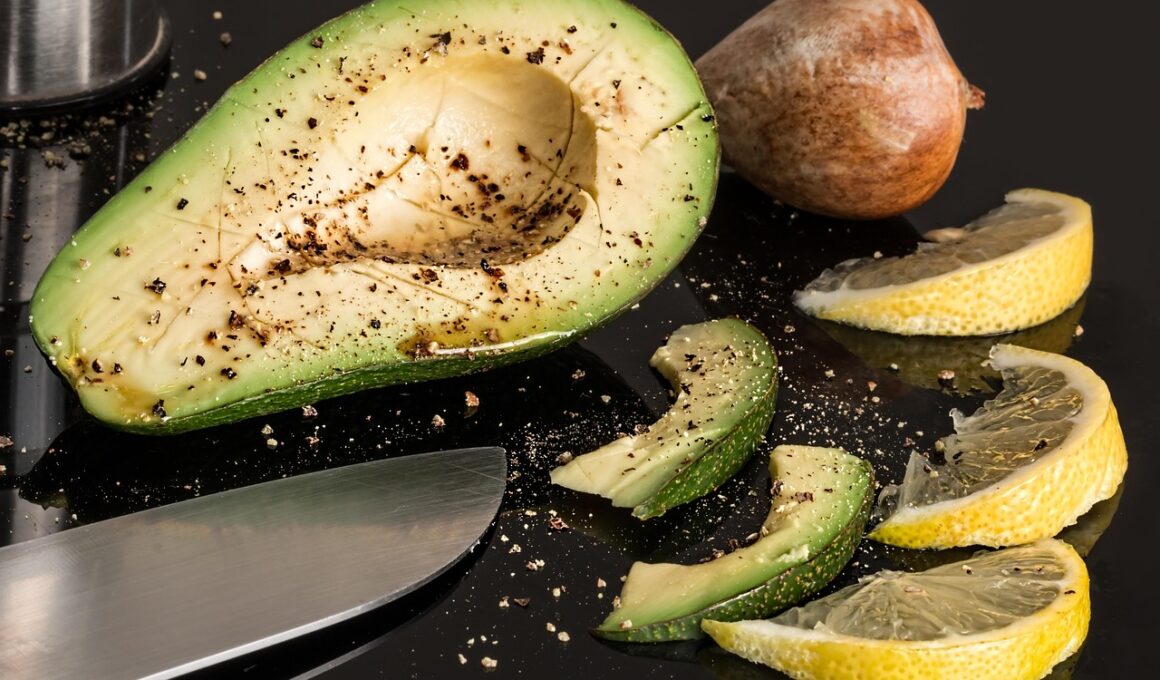Healthy Fats for Swimmers: Benefits and Sources
Swimmers require a balanced diet to support their rigorous training and performance goals. Healthy fats play a crucial role in this diet, acting as an essential energy source. Fats provide a concentrated source of calories necessary for prolonged physical activity. They also aid in the absorption of fat-soluble vitamins, such as A, D, E, and K, which are vital for maintaining overall health. Consuming the right types of fats can lead to improved endurance and recovery times. Omega-3 fatty acids, found in fish, walnuts, and flaxseeds, have anti-inflammatory properties that may help reduce muscle soreness and inflammation post-workout. Additionally, healthy fats can help regulate hormones and enhance cell function, making them crucial for swimmers who subject their bodies to extensive physical demands. As a swimmer, it’s vital to understand which fats benefit your body the most. Incorporating foods rich in healthy fats can lead to significant improvements in performance. The right approach to nutrition ensures that athletes can train harder and recover effectively from intense swimming sessions. Keep reading to explore the best sources of healthy fats for swimmers.
A variety of sources of healthy fats can be included in a swimmer’s diet. These food choices are essential for providing energy and supporting overall health. Some excellent sources of healthy fats include the following:
- Avocados: Packed with monounsaturated fats, avocados are great for heart health.
- Nuts and seeds: Almonds, walnuts, and chia seeds are rich in omega-3s.
- Fatty fish: Salmon and mackerel are excellent for omega-3 and protein intake.
- Olive oil: A staple in Mediterranean diets, it contains heart-healthy fats.
Eating these foods supports swimmers’ energy needs and helps maintain a healthy body. Incorporating a variety of these fats can prevent nutrient deficiencies and contribute to optimal performance in and out of the pool. Additionally, having the right fat balance can also positively impact mental focus, aiding swimmers during their competitions. Aim to incorporate healthy fats in moderation to maximize their benefits during training.
The timing of fat consumption is crucial for swimmers to maximize their performance benefits. Consuming healthy fats at the right times can significantly support energy levels and recovery. Swimmers should consider having a source of healthy fat as part of their pre-workout meal or snack. This can provide sustained energy during long training sessions or competitions. However, it is essential to avoid high-fat meals immediately before swimming, as digestion may slow performance. For optimal results, aim for a well-balanced meal or snack two to three hours before activity, incorporating healthy fats alongside carbohydrates and proteins. Post-workout, healthier fats can help restore glycogen levels and contribute to muscle recovery. Foods such as nut butter on whole grain toast can be an excellent option after an intense swim practice. Ensure that meals are balanced to include simple carbohydrates and high-quality proteins, complementing the healthy fat profile. Maintaining proper nutrition is vital for swimmers aiming to achieve their peak performance and support their intensive training regimens effectively.
Benefits of Omega-3 Fatty Acids
Omega-3 fatty acids offer numerous benefits for swimmers, making them a vital component of a swimmer’s nutrition. These essential fats are known for their anti-inflammatory properties, which can help lower inflammation caused by rigorous training. This is especially beneficial for recovery after long swimming sessions. Moreover, they contribute to improved cardiovascular health and brain function, both critical for athletes. Enhanced heart health allows swimmers to maintain optimal performance levels, while peak brain function can aid decision-making in competitive situations. Foods rich in omega-3s can include fatty fish like salmon, sardines, and trout. For those who prefer plant-based sources, chia seeds, flaxseeds, and walnuts provide excellent alternative options. It is essential for swimmers to ensure they’re consuming adequate omega-3s for overall health maintenance. Consider incorporating these foods into meals regularly to reap their benefits. For instance, try grilled salmon for dinner or add ground flaxseed to smoothies for a nutritious boost. Ensuring a well-rounded approach to nutrition, with a focus on omega-3 dietary intake, supports the swimming community and their unique nutritional needs.
Swimmers should also be cautious about the quantity of fats in their diet, balancing their intake of healthy fats against overall caloric needs. While healthy fats are crucial, overconsumption can lead to excess calorie intake and potentially hinder performance. Therefore, portion control should be observed when including these fat sources in meals. One helpful approach is to visually estimate portions, allowing swimmers to control fat intake while still enjoying their favorite foods. Using the palm of the hand to measure portions of nuts or oils can be effective. It’s also essential to balance fats with other macronutrients: carbohydrates and proteins for optimal energy and muscle recovery. A well-rounded diet will ensure swimmers have the endurance needed for training and competition. For example, a meal that combines healthy fats, lean proteins, and complex carbohydrates can produce sustained energy and peak performance. Being mindful of portion sizes helps swimmers find the right balance in their nutrition strategy, ensuring they meet their dietary needs without compromising performance. Ultimately, moderation is key for successful nutrition planning.
Integrating Healthy Fats into Meals
Swimmers can easily integrate healthy fats into their daily meals and snacks through various delicious options. For breakfast, incorporating nut butter on whole-grain toast or oatmeal can provide a great start. A smoothie made with spinach, banana, and almond milk is another nutritious option. Lunch meals can include a tasty salad topped with avocado slices or grilled chicken brushed with olive oil. These simple additions boost nutrient intake without overwhelming meals. Healthy fats can also enhance the flavor of dishes, making them more enjoyable. For dinner, consider incorporating recipes like grilled salmon with a side of roasted vegetable medley drizzled in olive oil. This approach not only keeps meals exciting but also aligns with dietary needs. Even snack time offers many opportunities to enjoy healthy fats, such as snacking on homemade trail mix with nuts, seeds, and dried fruit. Meal prep is another way swimmers can stay organized, allowing them to plan healthy meals while ensuring they’ve added diverse healthy fats. Finding ways to make healthy fats a regular part of the menu enhances nutrition while satisfying taste buds, benefiting swimmers overall.
Hydration and nutrition are equally essential for swimmers, especially during intense training. Combining hydration with healthy fats supports better physical performance and endurance. It’s crucial to stay well-hydrated throughout the day, especially before and after swim practices. Keeping the body hydrated aids digestion and helps fat molecules transport effectively. When consuming healthy fats, pairing them with adequate fluids ensures optimal nutrient absorption. Additionally, those engaged in swimming should consider electrolyte-rich beverages to promote hydration levels and enhance performance during competitions. Focus on integrating vegetables, fruits, and whole grains with healthy fats for a balanced plate while maintaining fluid intake. Smoothies and hydrating snacks like watermelon slices can act as recreational options while providing essential nutrients. Supported together, a well-hydrated body and healthy fats create an environment where swimmers can perform at their best. Encouraging a balanced approach to nutrition reinforces the importance of maintaining proper hydration, especially following swim sessions where fatigue can set in. Ultimately, pinpointing a nutritional strategy that aligns with training goals greatly enhances a swimmer’s experience and overall performance in the water.
In summary, healthy fats are a crucial component of swimming nutrition that should not be overlooked. Their inclusion offers multiple benefits, including improved endurance, muscle recovery, and enhanced overall health for swimmers. Focusing on quality fat sources such as avocados, nuts, and fatty fish ensures that athletes receive adequate energy for their challenging training demands. Understanding the appropriate timing for fat intake and combining them effectively with other macronutrients ensures that swimmers optimize their diets. Furthermore, hydration and proper meal integration contribute significantly to a swimmer’s success. With the guidance provided on the benefits and recommendations around healthy fats, swimmers should feel empowered to approach their diets confidently. Adopt a balanced perspective on nutrition while prioritizing the inclusion of essential fats to bolster training performance. Striking a balance between various nutrients, including healthy fats, is of utmost importance, allowing swimmers to achieve their goals with flair. Swimmers can train, recover, and excel when they make informed food choices that consider their unique dietary needs and performance aspirations. Taking charge of nutrition firmly places athletes on the path toward improved overall performance and health.


